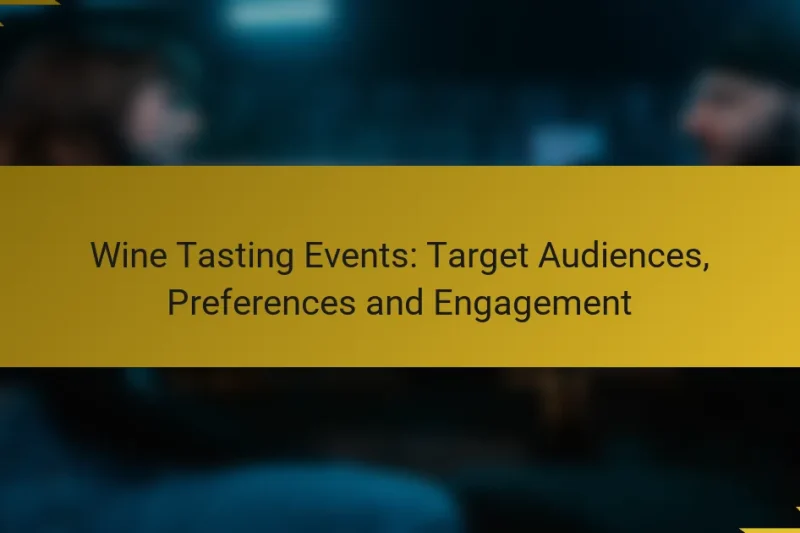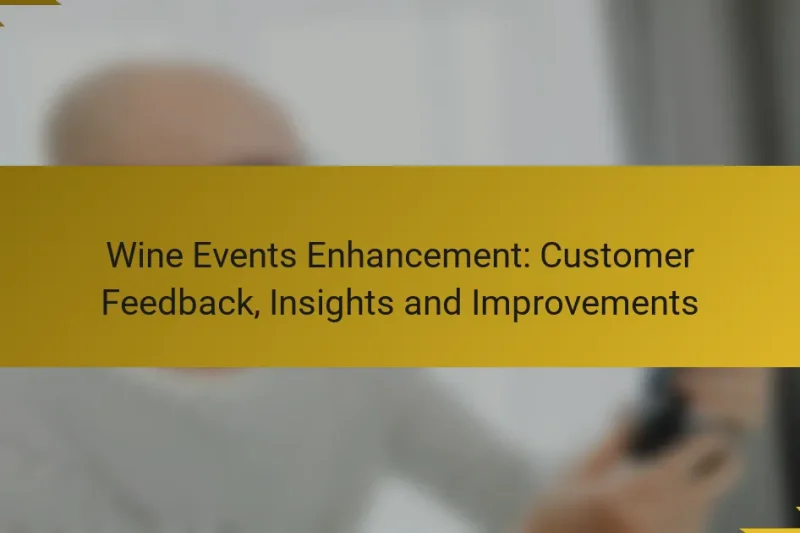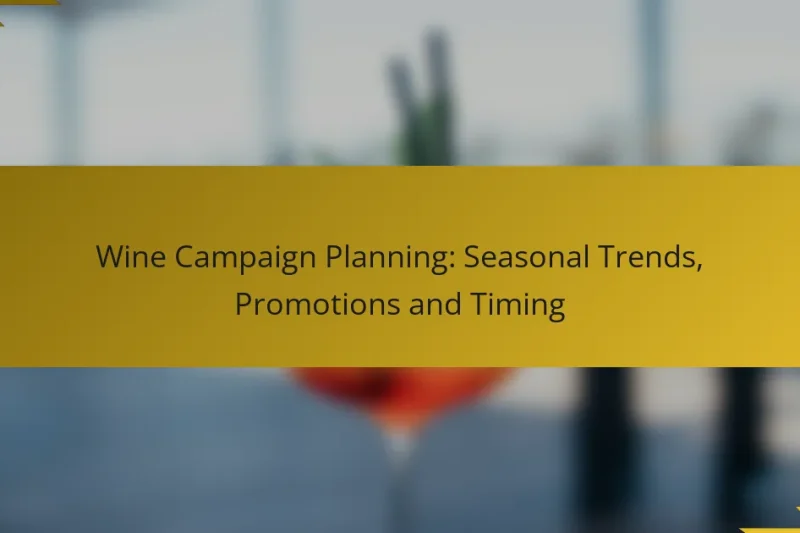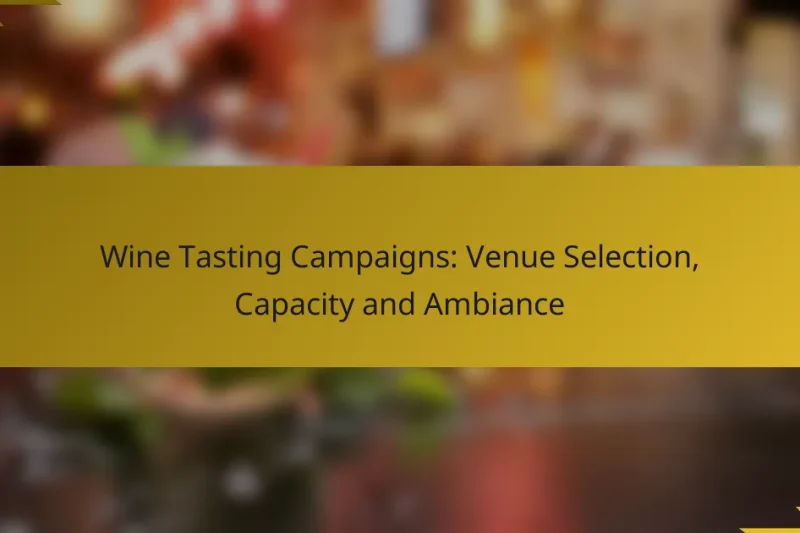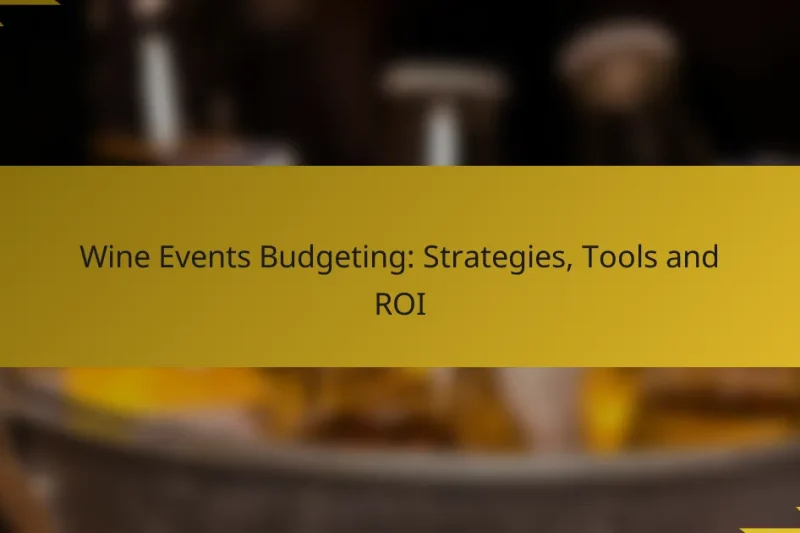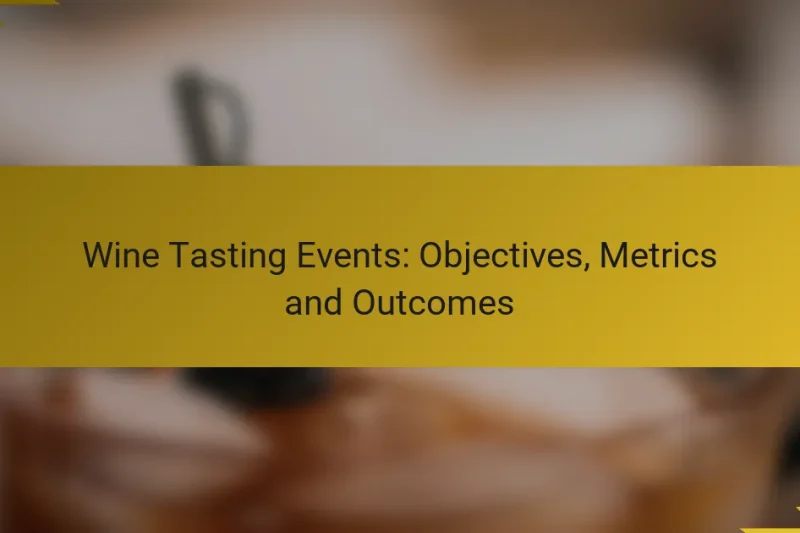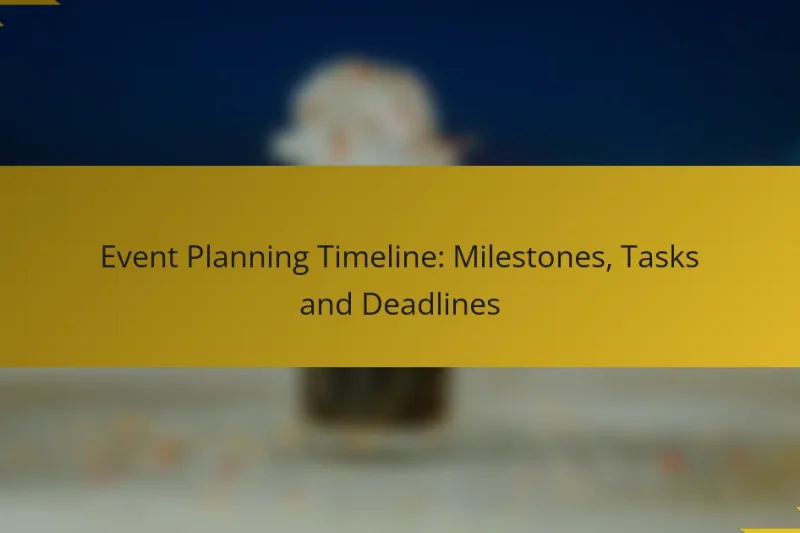Wine tasting events in California attract a variety of audiences, including wine enthusiasts, tourists, and corporate … Wine Tasting Events: Target Audiences, Preferences and EngagementRead more
Event Campaign Planning
Effective event campaign planning is crucial for achieving your objectives and engaging your audience. By setting clear goals and utilizing the right tools, you can streamline the process and enhance organization. Additionally, measuring success through key metrics will provide valuable insights for future improvements.
Wine Events Enhancement: Customer Feedback, Insights and Improvements
Enhancing wine events in California relies heavily on customer feedback, which offers crucial insights into attendee … Wine Events Enhancement: Customer Feedback, Insights and ImprovementsRead more
Wine Campaign Planning: Seasonal Trends, Promotions and Timing
Planning a successful wine campaign involves recognizing key seasonal trends that influence consumer preferences throughout the … Wine Campaign Planning: Seasonal Trends, Promotions and TimingRead more
Wine Tasting Campaigns: Venue Selection, Capacity and Ambiance
Choosing the right venue for wine tasting campaigns is crucial, as options like vineyard estates, wine … Wine Tasting Campaigns: Venue Selection, Capacity and AmbianceRead more
Wine Events Budgeting: Strategies, Tools and ROI
Budgeting for wine events requires a thorough understanding of associated costs, including venue rental, marketing, staffing, … Wine Events Budgeting: Strategies, Tools and ROIRead more
Wine Tasting Events: Objectives, Metrics and Outcomes
Wine tasting events are designed to enhance participants’ knowledge of wine, build community connections, and promote … Wine Tasting Events: Objectives, Metrics and OutcomesRead more
Event Planning Timeline: Milestones, Tasks and Deadlines
Effective event planning requires a clear timeline that outlines key milestones, essential tasks, and critical deadlines. … Event Planning Timeline: Milestones, Tasks and DeadlinesRead more
How to plan an effective event campaign?
Planning an effective event campaign involves setting clear objectives, understanding your audience, and managing resources wisely. A well-structured approach ensures that your event meets its goals and engages participants effectively.
Define campaign goals
Start by identifying what you want to achieve with your event campaign. Common goals include increasing brand awareness, generating leads, or fostering community engagement. Make your goals specific, measurable, achievable, relevant, and time-bound (SMART).
For example, instead of a vague goal like “increase attendance,” aim for “attract 200 attendees to the event within three months.” This clarity helps guide your planning and evaluation processes.
Identify target audience
Understanding your target audience is crucial for tailoring your event campaign. Consider demographics such as age, location, interests, and professional background. This information helps you craft messages and select channels that resonate with your audience.
Utilize surveys, social media insights, and market research to gather data about potential attendees. Creating audience personas can also help visualize and address their specific needs and preferences.
Set budget and resources
Establishing a budget is essential for effective event campaign planning. Consider all potential costs, including venue rental, marketing materials, catering, and technology. Aim to allocate funds based on priority areas to maximize impact.
Additionally, assess the resources available, such as staff, volunteers, and technology. A clear budget and resource plan can prevent overspending and ensure that all necessary elements are covered.
Create a timeline
A well-defined timeline is critical for keeping your event campaign on track. Start by listing all tasks and milestones, such as securing a venue, launching marketing efforts, and finalizing logistics. Assign deadlines to each task to ensure timely completion.
Using project management tools or calendars can help visualize the timeline and keep the team accountable. Regular check-ins can also help address any delays or challenges that arise.
Choose event format
The format of your event significantly impacts its success. Decide whether your event will be in-person, virtual, or hybrid, based on your audience’s preferences and logistical considerations. Each format has its own set of advantages and challenges.
For instance, in-person events often foster better networking opportunities, while virtual events can reach a broader audience at a lower cost. Evaluate the pros and cons of each format to determine what aligns best with your campaign goals and audience needs.
What tools can assist in event campaign planning?
Several tools can streamline event campaign planning, enhancing efficiency and organization. Key platforms like Eventbrite, Mailchimp, and Trello offer specific functionalities that cater to different aspects of event management.
Eventbrite for ticketing
Eventbrite is a leading platform for managing ticket sales and registrations for events. It allows organizers to create event pages, set ticket prices, and track sales in real-time.
Consider using Eventbrite if you expect a large number of attendees or need to manage multiple ticket tiers. The platform also integrates with various payment processors, making it easy to handle transactions securely.
Be mindful of fees associated with ticket sales, which typically range from a few percent to a flat fee per ticket, depending on your pricing model.
Mailchimp for email marketing
Mailchimp is a powerful tool for email marketing, ideal for promoting events and keeping attendees informed. It offers customizable templates and automation features to send targeted messages based on user behavior.
Utilize Mailchimp to segment your audience and tailor your communications, which can significantly improve engagement rates. Regular updates and reminders can help maintain interest leading up to the event.
Keep in mind that Mailchimp’s pricing varies based on the number of subscribers, with plans starting from free for basic features to paid options for advanced functionalities.
Trello for task management
Trello is an intuitive project management tool that helps teams organize tasks visually using boards and cards. It’s particularly useful for tracking the progress of various event planning activities.
Create a board for your event campaign and break down tasks into manageable cards, assigning deadlines and team members. This visual approach can enhance collaboration and ensure accountability.
To maximize Trello’s effectiveness, regularly update the status of tasks and hold brief check-ins with your team to address any roadblocks or adjustments needed.
How to measure the success of an event campaign?
Measuring the success of an event campaign involves evaluating various metrics that reflect attendance, engagement, and overall return on investment (ROI). By focusing on these key areas, you can gain insights into what worked well and what could be improved for future events.
Track attendance numbers
Tracking attendance numbers is crucial for understanding the reach of your event campaign. This includes not only the total number of attendees but also the demographics of participants, such as age, location, and interests. Aim for a clear comparison between expected and actual attendance to gauge effectiveness.
Consider using registration platforms that provide analytics on ticket sales and attendee demographics. For example, if you anticipated 200 attendees but only attracted 150, analyze the reasons behind the shortfall to adjust your marketing strategies for future events.
Analyze engagement metrics
Engagement metrics help you assess how actively participants interacted with your event. Key indicators include social media shares, comments, and likes, as well as participation in polls or Q&A sessions. High engagement often correlates with a successful event experience.
Utilize tools like Google Analytics to track website traffic related to your event and monitor social media analytics for posts related to the event. For instance, if your event hashtag received hundreds of mentions, it indicates strong audience interest and engagement.
Evaluate ROI
Evaluating ROI involves comparing the costs of your event campaign against the revenue generated or benefits gained. This can include ticket sales, sponsorships, and merchandise, as well as intangible benefits like brand awareness and customer loyalty.
To calculate ROI, use the formula: (Net Profit / Total Costs) x 100. For example, if your event generated $10,000 in revenue with $5,000 in costs, your ROI would be 100%. This metric helps you determine whether the event was financially worthwhile and informs future budget allocations.
What are common challenges in event campaign planning?
Event campaign planning often faces several challenges that can hinder success. Key issues include budget constraints, time management issues, and vendor coordination, each requiring careful attention to ensure a smooth execution.
Budget constraints
Budget constraints are a primary challenge in event campaign planning, as they dictate the scope and quality of the event. It’s essential to establish a clear budget early on, allocating funds for venue, catering, marketing, and other critical elements.
To manage budget constraints effectively, prioritize spending based on the event’s goals. For example, if attendee experience is paramount, invest more in quality catering and entertainment while trimming costs in less impactful areas.
Time management issues
Time management issues can derail event planning, leading to rushed decisions and overlooked details. Creating a detailed timeline with milestones helps ensure that all tasks are completed on schedule.
Consider using project management tools to track progress and deadlines. Regular check-ins with your team can help identify potential delays early, allowing for adjustments to keep the campaign on track.
Vendor coordination
Coordinating with multiple vendors is crucial for a successful event, but it can be complex. Clear communication and established expectations are vital to avoid misunderstandings and ensure that all parties are aligned.
Develop a vendor checklist that includes key contacts, responsibilities, and timelines. Regular updates and meetings can help maintain strong relationships and ensure that everyone is on the same page leading up to the event.
What are the best practices for promoting an event?
Effective event promotion involves a strategic mix of digital marketing techniques to maximize reach and engagement. Key practices include utilizing social media, leveraging influencer partnerships, and implementing targeted email marketing strategies.
Utilize social media platforms
Social media platforms are essential for promoting events due to their vast audience reach and engagement capabilities. Create event pages on platforms like Facebook and Instagram, and share engaging content such as videos, countdowns, and behind-the-scenes glimpses to attract attention.
Consider using paid advertising options to target specific demographics and increase visibility. Regularly post updates and encourage attendees to share the event to amplify your reach.
Leverage partnerships with influencers
Collaborating with influencers can significantly enhance your event’s visibility. Identify influencers whose audience aligns with your target demographic and invite them to participate or promote your event in exchange for free tickets or exclusive access.
Influencers can create authentic content that resonates with their followers, driving interest and attendance. Ensure that the partnership feels genuine to maintain credibility with the audience.
Implement email marketing strategies
Email marketing remains a powerful tool for event promotion. Build a targeted email list by collecting addresses through your website or social media channels. Send out well-crafted invitations and regular updates to keep potential attendees informed and engaged.
Utilize segmentation to tailor messages based on user interests or past attendance. Include clear calls to action and consider offering early bird discounts to incentivize quick registrations.
